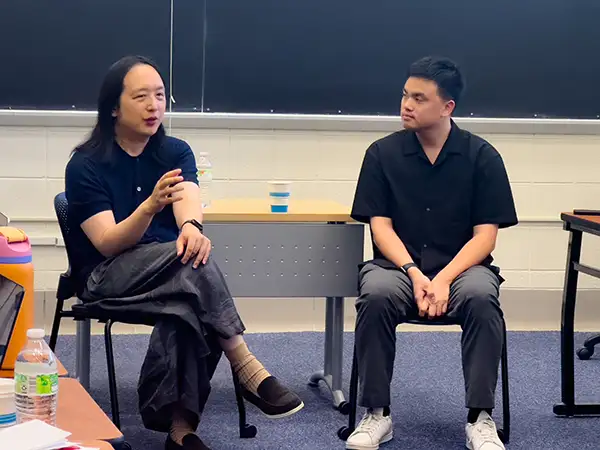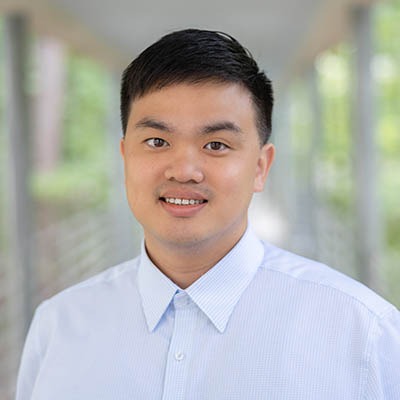
Duke News
Keep up with our core and affiliated faculty in the national and international news. Read their op-ed pieces, quotes and interviews, and cutting-edge research findings.
Tue, May 06
David Hoffman Named Interim Director of Duke Science & Society
Duke University faculty member David Hoffman, Steed Family Professor of the Practice of Cybersecurity Policy at the Sanford School of Public Policy, has been chosen to serve as interim director of the Duke Initiative for Science & Society.
A Duke alumnus, Hoffman earned his J.D. at the Law School and was a member of the Duke Law Journal. Previously, he served as associate general counsel, director of security policy and global privacy officer for Intel Corporation.
Science & Society is among 11 university institutes, initiatives and centers that complement and amplify the widespread interdisciplinarity found in every school at Duke.
Hoffman begins serving as interim director on July 1, 2025, following the founding directorship of Nita Farahany, Robinson O. Everett Distinguished Professor of Law.
“As a former leader at Intel, a seasoned classroom interlocutor, a policy expert and a superlative leader of applied research teams, David Hoffman will bring a remarkable breadth of experience to Science & Society,” said Vice Provost for Interdisciplinary Studies Edward Balleisen. He further expressed his gratitude to Farahany for leading the initiative since 2013. “Her keen leadership of Science & Society has helped to make Duke a nationally recognized place for cutting-edge scholarship on bioethics and the increasingly complex policy dilemmas posed by rapid advances in information technology,” Balleisen said.
The author of many papers and articles on cybersecurity and privacy, Hoffman has testified to Congress on these topics. He previously chaired the Civil Liberties and Privacy Panel for the Director’s Advisory Board for the U.S. National Security Agency and chairs the Board of the Center for Cybersecurity Policy and Law.
“It is an honor to have the opportunity to continue Professor Farahany’s incredible work within a structure that capitalizes on Duke’s interdisciplinary education and research strengths,” Hoffman said. “The initiative’s focus on applied ethics in science and technology provides critical tools for students to use to meet the challenges they will face as they enter careers in both the public and private sectors.”
Hoffman also founded and chairs the board for the Triangle Privacy Research Hub, which highlights and fosters cybersecurity and privacy academic research in North Carolina’s Research Triangle.
“I am grateful to Nita Farahany for making Duke Science & Society such a vital part of the university,” said Provost Alec Gallimore. “I’m confident that David Hoffman will build on Nita’s strong foundation to lead the initiative into its next chapter in continued alignment with Duke’s strategic priorities.”
The Duke Initiative for Science & Society’s mission is to advance the responsible use of science and technology for humanity through research, education, communication, democratic deliberation and policy engagement. The initiative runs the Master of Arts in Applied Ethics & Policy program, offers numerous courses and programs for undergraduates, hosts the Duke Center on Risk, and leads a robust series of community engagement activities.
Hoffman has been involved with Science & Society since 2019. He is also an affiliate faculty member of the Duke-Margolis Institute for Health Policy.
Mon, May 05
Spotify is Paying Musicians Poverty Wages. Why are Antitrust Laws Protecting Them?
Imagine you’re a vocalist. Since you were a young child you spent countless nights rehearsing to sing your heart out every Sunday for the church choir. You always knew singing was your passion and now you’re finally at an age where you can make your musical dreams come true.
You want to record your first album but to rent the studio for 5 days, you need to come up with $5000. Not only that, but you need to hire an engineer and producer to synthesize everything. Another $5000 setback. You probably need some background musicians. Perhaps just the basics: a guitarist, bass, and drummer. They each charge $500 per day. And don’t forget you need $1000 to mix each song. All in all, you need to find roughly $27,500 to fully produce your album.
Mon, Apr 28
Researchers Secretly Ran a Massive, Unauthorized AI Persuasion Experiment on Reddit Users
A team of researchers who say they are from the University of Zurich ran an “unauthorized,” large-scale experiment in which they secretly deployed AI-powered bots into a popular debate subreddit called r/changemyview in an attempt to research whether AI could be used to change people’s minds about contentious topics.
Sat, Apr 26
When Technology Serves Democracy: Insights from Cyber Ambassador Audrey Tang’s Duke Visit
It was a tremendous honor to welcome Audrey Tang to Duke University. Tang was contacted when Professor Tommy Sowers challenged students in his Science, Technology, Ethics, and Leadership class to invite inspiring industry and thought leaders to speak in class. Tang is Taiwan’s first Digital Minister, renowned for leading a series of pioneering digital initiatives that have transformed democratic practices. She now serves as Taiwan’s Cyber Ambassador, continuing her mission to share the spirit of digital democracy with the world.

During her visit to Duke, Tang engaged with students from Science and Society, Public Policy, and various members of the public. She eloquently shared how she has leveraged digital technology to foster public discourse and crowdsource policymaking. For instance, to combat fraudulent advertisements on social media platforms, her team did not rely solely on expert panels. Instead, they randomly invited citizens of all age groups and ethnic backgrounds to express their opinions through text messages and participate in an open discussion on an online platform, akin to a jury system. Through this radically inclusive process, innovative and broadly supported solutions quickly emerged, leading to the efficient and effective implementation of new policies within a few months.
At the core of Tang’s work is the concept of Plurality. Rather than accepting the idea that technology and democracy must be in conflict, Plurality envisions a future where collaborative technologies enhance democratic values. It advocates for open and decentralized systems that bridge social, cultural, and political divides. In contrast to centralized technologies that reinforce authoritarianism and social fragmentation, Plurality aims to protect digital human rights, foster participatory governance, and create new pathways for collective action. From Taiwan’s platform to decentralized governance models around the world, Tang demonstrates how Plurality is already facilitating more empathetic, inclusive, and democratic societies.
Her visit was more than a presentation; it served as a living example of how an interdisciplinary and ethically driven technologist can advance democracy through innovation. After her talk, a classmate approached us and said with emotion, “It was so inspiring seeing that there is actually someone realizing this ideal.” Tang’s work made tangible the connection between ethics, technology, and the public good, inspiring many of us to envision new possibilities.

As a Taiwanese, having Audrey Tang at Duke carried an even deeper meaning for me. Taiwan is a young democracy with a vibrant technological landscape. The Taiwanese people continuously fight for freedom and embrace innovative ways to improve collective well-being. She embodies this spirit fully. Through her visit, many at Duke glimpsed the resilience, creativity, and optimism of Taiwan, and I am proud that they learned about my home through her example.
Watch Audrey Tang’s presentation on our YouTube Channel.
Interested in learning more about Audrey Tang’s work?
Check out these tools and resources she mentioned during her talk:
- ROOST Tools – Robust Open Online Safety Tools for builders.
- Project Liberty – building solutions that help people take back control of their digital lives by reclaiming a voice, choice, and stake in a better internet.
- Gov-zero – a decentralized civic tech community with information transparency, open results and open cooperation as its core values.
- “Conversation Networks” – a recent position paper co-authured by Audrey Tang that introduces the idea of conversation networks as a basis for civic communication infrastructure that combines interoperable digital apps with the thoughtful integration of AI guided by human agency.
- What Could BG Be? – a U.S. example in practice. This month-long, online conversation was hosted by the BG 2050 Project. Over the course of 33 days, 7,890 local residents of Warren County shared 3,940 unique ideas for the future of Warren County and weighed in 1,034,868 times.
 Jiunn-Tyng Yey
Jiunn-Tyng Yey
Jiunn-Tyng Yeh (Tyng) is a candidate in the Duke University Master of Arts in Applied Ethics & Policy. He obtained his M.D. from National Yang Ming Chiao Tung University in Taiwan in 2022 and completed a Ph.D. in Neuroscience at the University of Missouri-Columbia in 2019. Prior to his graduate studies at Duke, Tyng underwent a general residency physician training in Taiwan for a year, then worked as a postdoctoral researcher at the Center for Artificial Intelligence in Medicine at Chang Gung Memorial Hospital in Taiwan. His research interests include the integration of AI in clinical settings, and the ethical implications and policy frameworks of neurotechnology.
Sat, Apr 19
OpenAI Will Invest $50 Million In A New University Research Consortium
OpenAI, the artificial intelligence research company, is investing $50 million in a new 15-institution research consortium aimed at exploring how artificial intelligence can advance knowledge in several fields.
The NextGenAI consortium is intended to “catalyze progress at a rate faster than any one institution would alone,” according to the company’s announcement. It’s the latest entry for the company into the higher education space, following its introduction of ChatGPT Edu last May. “This initiative is built not only to fuel the next generation of discoveries, but also to prepare the next generation to shape AI’s future,” wrote OpenAI.

